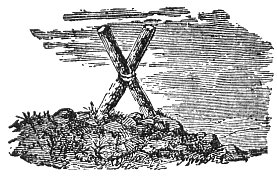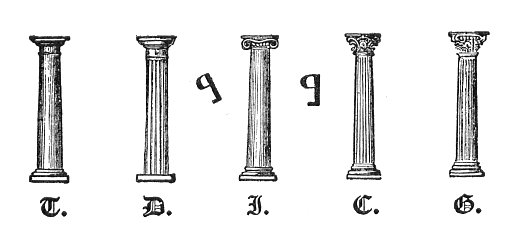It is not only true that we may learn the moral law of justice, the law of right, by experience and observation; but that God has given us a moral faculty, our conscience, which is able to perceive this law directly and immediately, by intuitive perception of it; and it is true that man has in his nature a rule of conduct higher than what he has ever yet come up to,–an ideal of nature that shames his actual of history: because man has ever been prone to make necessity, his own necessity, the necessities of society, a plea for injustice. But this notion must not be pushed too far–for if we substitute this ideality for actuality, then it is equally true that we have within us an ideal rule of right and wrong, to which God Himself in His government of the world has never come, and against which He (we say it reverentially) every day offends. We detest the tiger and the wolf for the rapacity and love of blood which are their nature; we revolt against the law by which the crooked limbs and diseased organism of the child are the fruits of the father’s vices; we even think that a God Omnipotent and Omniscient ought to have permitted no pain, no poverty, no servitude; our ideal of justice is more lofty than the actualities of God. It is well, as all else is well. He has given us that moral sense for wise and beneficent purposes. We accept it as a significant proof of the inherent loftiness of human nature, that it can entertain an ideal so exalted; and should strive to attain it, as far as we can do so consistently with the relations which He has created, and the circumstances which surround us and hold us captive.
If we faithfully use this faculty of conscience; if, applying it to the existing relations and circumstances, we develop it and all its kindred powers, and so deduce the duties that out of these relations and those circumstances, and limited and qualified by them, arise and become obligatory upon us, then we learn justice, the law of right, the divine rule of conduct for human life. But if we undertake to define and settle “the mode of action that belongs
p. 833
to the infinitely perfect nature of God,” and so set up any ideal rule, beyond all human reach, we soon come to judge and condemn His work and the relations which it has pleased Him in His infinite wisdom to create.
A sense of justice belongs to human nature, and is a part of it. Men find a deep, permanent, and instinctive delight in justice, not only in the outward effects, but in the inward cause, and by their nature love this law of right, this reasonable rule of conduct, this justice, with a deep and abiding love. Justice is the object of the conscience, and fits it as light fits the eye and truth the mind.
Justice keeps just relations between men. It holds the balance between nation and nation, between a man and his family, tribe, nation, and race, so that his absolute rights and theirs do not interfere, nor their ultimate interests ever clash, nor the eternal interests of the one prove antagonistic to those of all or of any other one. This we must believe, if we believe that God is just. We must do justice to all, and demand it of all; it is a universal human debt, a universal human claim. But we may err greatly in defining what that justice is. The temporary interests, and what to human view are the rights, of men, do often interfere and clash. The life-interests of the individual often conflict with the permanent interests and welfare of society; and what may seem to be the natural rights of one class or race, with those of another.
It is not true to say that “one man, however little, must not be sacrificed to another, however great, to a majority, or to all men.” That is not only a fallacy, but a most dangerous one. Often one man and many men must be sacrificed, in the ordinary sense of the term, to the interest of the many. It is a comfortable fallacy to the selfish; for if they cannot, by the law of justice, be sacrificed for the common good, then their country has no right to demand of them self-sacrifice; and he is a fool who lays down his life, or sacrifices his estate, or even his luxuries, to insure the safety or prosperity of his country. According to that doctrine, Curtius was a fool, and Leonidas an idiot; and to die for one’s country is no longer beautiful and glorious, but a mere absurdity. Then it is no longer to be asked that the common soldier shall receive in his bosom the sword or bayonet-thrust which otherwise would let out the life of the great commander on whose fate hang the liberties of his country, and the welfare of millions yet unborn.

Moe is the founder of GnosticWarrior.com. He is a father, husband, author, martial arts black belt, and an expert in Gnosticism, the occult, and esotericism.







